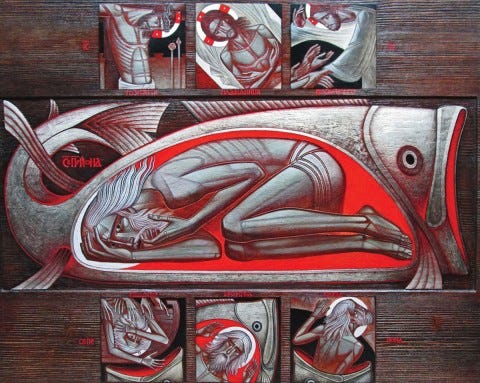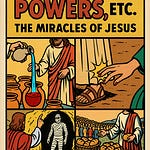Second Sunday of Lent — 1 Kings 21
On September 1, 1939, his covetous gaze having landed upon his neighbor’s land to the east, the Fuhrer in Berlin invaded Poland. The Nazi invaders met with open armed resistance, which they put down with brutality by the end of the next month. It took only a few more months until most of the Polish population acquiesced or enabled the German occupation.
One stood out.
In 1940, if not for the chaos and disarray of the occupation, Teresa Prekerowa would have been a high school senior. Teresa was a Christian. More importantly, Teresa was a Christian who knew that being a Christian might often or might eventually require her to act as Christ and stand out. Before the war, she had studied at a Catholic boarding school. Her family was relatively well-off, landowners in rural Poland. They even cultivated a vineyard. The Prekerowa family’s land had been passed down from one generation to the next as an inheritance. Their property was stolen when the Germans invaded and forced the family to relocated to Warsaw where they rented an apartment in the city.
Soon thereafter, as the thieves’s plot thickened and the occupation’s grip tightened, Teresa’s father was arrested by Section 581 of the Military Field Police. Her uncle was killed in battle. Two of her brothers languished in German prisoner-of-war camps.
In late 1940, after destroying much of the city and killing twenty-five thousand people in an air raid campaign, Germany began to establish ghettos in the parts of Warsaw under their control and to exile Polish Jews into the ghettos from which they would eventually be transported to death camps.
Teresa stood out.
Though only a young woman, she refused to adjust to her circumstances or accept the new situation as normal.
For example—
Teresa noticed how very early into the occupation Christian families in Warsaw quietly allowed their Jewish friends to slip away from their lives. Thus, they enabled the crime being done to them by neglecting what they ought to have done for their neighbors. Teresa’s own brother was one who, in the name of safety and survival, turned his back on his Jewish girlfriend and her family.
But Teresa stood out.
In late 1940, Teresa started sneaking into the Jewish ghetto in Warsaw. At first, she took food and medicine and clothing to the Jews she knew in the ghetto. Soon, she was taking supplies to Jews she did not know. By the end of 1940, Teresa had persuaded her brother’s girlfriend to escape the ghetto. In 1942, Teresa helped the girl’s parents and brother escape. That same summer the Germans carried out what they called the “Great Action,” deporting some 265,040 Jews to the death factory at Treblinka to be murdered and killing another 10,380 Jews in the ghetto itself. Thus, Teresa saved a family from certain death.
Teresa snuck in and out of the ghetto dozens and dozens of times.
The risk was terrific.
She never told her family.
Nor did she much like to talk about her witness at all.
After the war, Teresa Prekerowa became a historian of the Holocaust, but she did not write about herself. In an oral interview, Teresa dismissed the notion that she was in any way exceptional.
She called her actions “normal:”
“When a believer is bound by the double-love command of the Bible— love of God enacted as love of neighbor— then it’s simply to be expected that sooner or later you will need to embrace stranger-hood. It’s the normal course for a Christian.”
Notice—
No one stood out for Naboth.
After he anoints his successor, Elisha, the prophet Elijah disappears from the narrative. The Book of Kings shifts to reporting on the war which breaks out between Israel and Syria. Only with Yahweh’s help does King Ahab repel the host of King Benhadad of Syria. Victory in hand, Ahab then retires to his royal residence in the countryside at Jezreel in order to enjoy his hard-won peace.
These are the circumstances of the passage.
Adjacent to the king’s country estate is a vineyard tended by a Jew named Naboth. His name means “prophets.” Proving that idolatry is not a victimless crime (nor is God its only victim), no sooner has Ahab retired to his rural retreat than he begins to covet what belongs to his neighbor.
Initially at least, Ahab is not corrupt; he’s a good capitalist. He offers Naboth an exchange of land or the equivalent value in cash for the vineyard.
Ahab makes Naboth an offer he can’t refuse.
And Naboth refuses it.
He stands out.
He is not afraid to confront Ahab as a worshipper of Yahweh, “Yahweh forbid it that I should sell the inheritance of my fathers.” Naboth means that literally. According to Leviticus 25, it is unlawful for God’s people to sell an inheritance. That Naboth not only cites the command but obeys it is but an indication that he is one of the faithful few whom the Lord has preserved in Israel.
Naboth’s refusal to sell his inheritance wounds Ahab’s pride, and the king retreats home to pout. But just because a president is pathetic does not mean he is not dangerous. Once again Ahab gets another to do what he lacks the gumption to do. He tells his wife knowing that she will act for him without restraint. Whereas the king had recapitulated David’s sin, coveting what belonged to his neighbor, the queen now completes the recapitulation. Jezebel sends out letters, sealed under her husband’s name, designed to result in Naboth’s murder— just like David sent word to arrange for the husband of Bathsheba to be moved to the front lines. Jezebel’s letter proclaims a community-wide fast. Such a proclamation suggests either a calamity looms on the horizon or a serious crime has been committed.
Pay attention to the details in the passage:
The queen’s letters assemble “All the men of the city, the elders, and the leaders who lived in Jezreel.”
And “they all do as Jezebel told them.”
None stand out.
The idolatrous ruler cows and corrupts those under his rule.
The sealed letters gather the whole town in collusion.
As commanded by the queen, the town puts Naboth at the front of the crowd. On either side of Naboth they place two accomplices from whom they suborn false testimony before a sham trial in a kangaroo court.
Notice the charge against the faithful Jew, blasphemy: “Naboth cursed God and the king!” The charge is outrageously ironic given that it’s levied by idolators.
Without even the pretense of a verdict, like another faithful Jew, Naboth is handed over and led outside the city and executed in a judicial murder.
Jezebel could have simply ordered one of her soldiers to kill Naboth. The queen’s excessively expansive scheme ensured that everyone who knew of the plot was a part of the plot. Just so, there was no witness to their crime because they were all a party to it.
Except—
There was one witness: the Lord from whom no secrets are hid.
Naboth’s body was buried in the ground but his blood cried out to heaven for justice. Naboth’s blood adds its voice to the refrain that recurs throughout the Bible:
““How long, O Lord, will You refrain from judging and avenging our blood?”
There are no unsolved cases with the Living God. The Lord sees. He is not only our Judge. He is able to give eyewitness testimony to our crimes.
And so Jesus encounters Elijah and Jesus dispatches Elijah to confront Ahab once again. Remember, Elijah is still Israel’s Most Wanted Man. But Elijah makes no scruple about endangering himself to stand before God’s enemies and hand over the word that the Lord Jesus has given him to declare,
“Have you killed, and also taken possession? “Thus says the Lord: In the place where dogs licked up the blood of Naboth, dogs will also lick up your blood.””
The speaking of the word of God is God. Thus, for Ahab to receive this word of the Lord is for the king to stand before the Judge. And like the prophet Nathan to David (“You are the man!”), the word works on Ahab. Like the prodigal son in the far country, “he comes to himself.” Ahab suddenly realizes that he is “dead in his trespasses.”
He tears off his clothes, in ritual mourning.
Naked, he puts sackcloth over his bare body.
And then Ahab commences a fast.
Having seen his crimes, the Lord now sees Ahab’s repentance.
And God changes his mind.
He forgives Ahab's sins.
Which— let’s be clear— DOES NOT BRING NABOTH BACK!
Perhaps it’s unsurprising, but the mainstream press has done a poor job of making clear that Alexei Navalny, the dissident whom Vladimir Putin most certainly had murdered last week in his arctic prison, was a committed and articulate Christian. In his closing remarks at his 2021 sham-trial, Navalny testified plainly to the Christian convictions which animated and informed his resistance to authoritarianism.
Navalny told the court:
“The fact is I am a Christian. That I am a Christian usually sets me up as an example for ridicule in the Anti-Corruption Foundation, because mostly our activists are atheists, and I was once quite a militant atheist myself.”
It’s not hard to be an atheist when the leaders of the church and so many of its members support a corrupt, lying authoritarian.
And then Navalny added:
“But now, I am a believer, and that helps me a lot because everything becomes clearer. There are fewer dilemmas in my life, because the Bible, in general, is more or less clear what action to take in every situation. It’s not always easy to follow this book, of course, but I am actually trying. While certainly not really enjoying the place where I am, I have no regrets. On the contrary, I feel a real kind of satisfaction. Because at some difficult moment I did as required and did not betray the commandment.”
Specifically, Navalny said, he was motivated by the words of Jesus:
“Blessed are those who hunger and thirst for righteousness, for they will be satisfied.”
The Greek word translated into English as righteousness (dikaiosune) is the same word for the English word justice.
Blessed are those who are ravenous for justice.
Here’s my question:
Was Navalny wrong about God?
Was he wrong that the true God is a God of justice?
After all, the Lord sees Ahab’s repentance and the Lord changes his mind. The Lord saw. The Lord hears Naboth’s blood crying out from the ground, and the Lord changes his mind?
The Lord passes over Ahab’s sins.
But Naboth’s blood does not cry out from the ground for forgiveness.
It demands justice.
As New Testament scholar Reginald Fuller insists:
“Forgiveness is too weak a word” to serve as shorthand for the gospel.
In Romans 3, in the midst of his argument about justification, Paul includes a claim that is as intriguing as it is often ignored.
First, Paul announces that “all are justified by God’s grace as a gift, through the redemption that is in Christ Jesus.” So far so good— fairly familiar stuff.
Next in the logic chain, Paul explains that sinners are redeemed in Christ Jesus exactly because God the Father put forward God the Son “as a propitiation by his blood to be received by faith.” In other words, the Son’s self-offering is a sacrifice that appeases the wrath of the triune God. This self-offering includes you to the extent you receive it in faith. Again, this is astonishing but it is not surprising. It’s Gospel 101. Not only is it familiar, it sounds like Paul’s still speaking about forgiveness. But then, after he’s specified the What and the How of the gospel, Paul lays down the Why.
Why has the Father elected to redeem us through the Son whose blood he put forward as a propitiation for sin? Paul’s answer— pay attention: “This was to show God’s justice, because in his divine forbearance he had passed over former sins. It was to show his justice at the present time, so that he might be just.”
“This was to show God’s justice, because in his divine forbearance he had passed over former sins. It was to show his justice at the present time, so that he might be just.”
Thus—
Jesus is not simply God’s justification of sinners.
Jesus is God’s justification of God.
Again and again in scripture, the Lord demands justice for those who prey upon the poor. Again and again in scripture, God sends his prophets to announce impending judgment for his people’s idolatry and unfaithfulness, their sin and outright evil. But again and again in the Bible, just when God’s gavel is about to crack, God changes his mind.
He changes his mind.
He does not put wrongs to right.
He passes over sins.
To anyone who actually reads it, the offense of the Old Testament is not that God is angry and judgmental.
The offense of the Bible is that God is so outlandishly, unjustly patient.
By the time you get the end of the Book of Kings, you’re not left troubled by God’s wrath. By the time you come to 2 Kings 25.30, you’re left wondering, “How can God let them get away with this?”
If anything, the God of Israel is not angry and vengeful; in fact, by the Bible’s own estimation, the Lord is irresponsibly indulgent.
Again: “[The self-offering of the Son] was to show his justice at the present time, so that he might be just.”
Translation: Heretofore, God had not been just.
No doubt, Naboth wondered where in the hell was the God of justice as he was handed over and led outside the city.
According to the apostle Paul, before the cross is about us.
It is about God.
In putting forward God the Son on the cross, the triune God is actually justifying his own behavior. Finally, God shows that he is just by executing his judgment upon Jesus on behalf of those who are otherwise guilty and undeserving.
The patience of the Father culminates in the passion of the Son.
The innocent Jesus, innocent because he fulfilled the double love commandment, offers himself on behalf of the guilty. In being handed over, in being condemned under a charge of blasphemy, in being led outside the city to what the Bible calls “the winepress of God’s wrath,” God the Son carries with him all the sins sinned against every Naboth. And then on the cross, the God the Father finally cracks the gavel and pronounces the judgment on Jesus. In doing so, the triune God displays his justice, giving sin what it deserves.
Only, the Judge is judged in our place.
Which— still— DOES NOT BRING NABOTH BACK!
This is why the gospel is not gospel if the crucified one stayed in the tomb.
As Paul continues his argument in the epistle, Christ, who died for our trespasses, was “raised for our rectification.”
Rectification—
Christ was raised for God’s creation to be put to right. Christ was raised for God’s justice to be complete. Christ was raised as the first fruit.
As the theologian Paul Hinlicky writes:
“The promise of the resurrection is the promise of the reversal of worldly injustices and the public justification of the justice of God to the eternal comfort of every innocent victim of human and superhuman malice at the culmination of the project of creation. God's will must finally prevail in this way, or we do not believe that God in the Christian sense exists whatsoever. That atheism is of course a human possibility. But it is not a Christian possibility.”
In other words, God is getting Naboth back.
If not, if there is no ultimate justice— justice that redounds all the way back through the past, righting every wrong— then it’s not the case that the God of the Bible is wicked.
It’s that the God of the scriptures is not.
Immediately after his murder, the Free Press published letters Alexei Navalny had exchanged with the former Soviet dissident Natan Sharansky.
Sharansky, a Jewish journalist, had been a prisoner in the same Gulag during the 1970’s about which Sharansky wrote a memoir entitled Fear No Evil. After reading the Fear No Evil, Navalny wrote to Sharansky, and Sharansky replied with two letters of his own. What’s striking about their correspondence is how replete it is with scripture and the moral clarity the Bible demands.
In his final letter to Sharansky, dated April 11, 2023, Navalny concludes with this confession of faith:
“In your alma mater— that is, this Gulag— everything is as it was. Traditions are honored. On Friday evening, they let me out of solitary, today on Monday—I got another 15 days. Everything according to the Book of Ecclesiastes: what was, will be. But I continue to believe that God will correct it and one day there will be what was not. And will not be what was.
Hugs,
A”
One day there will be what was not; and there will not be what was.
One day there will be justice.
And injustice will not be.
Or rather—
One day what was finished on Calvary will be fulfilled in New Creation.
That is—
One day God will stand out.
Which, of course, is exactly what we say at the end of the Great Thanksgiving, “when Christ comes back in final victory and we feast at his table.”
With Naboth.
Some come to the table.
And with bread and wine, point to the future.

















